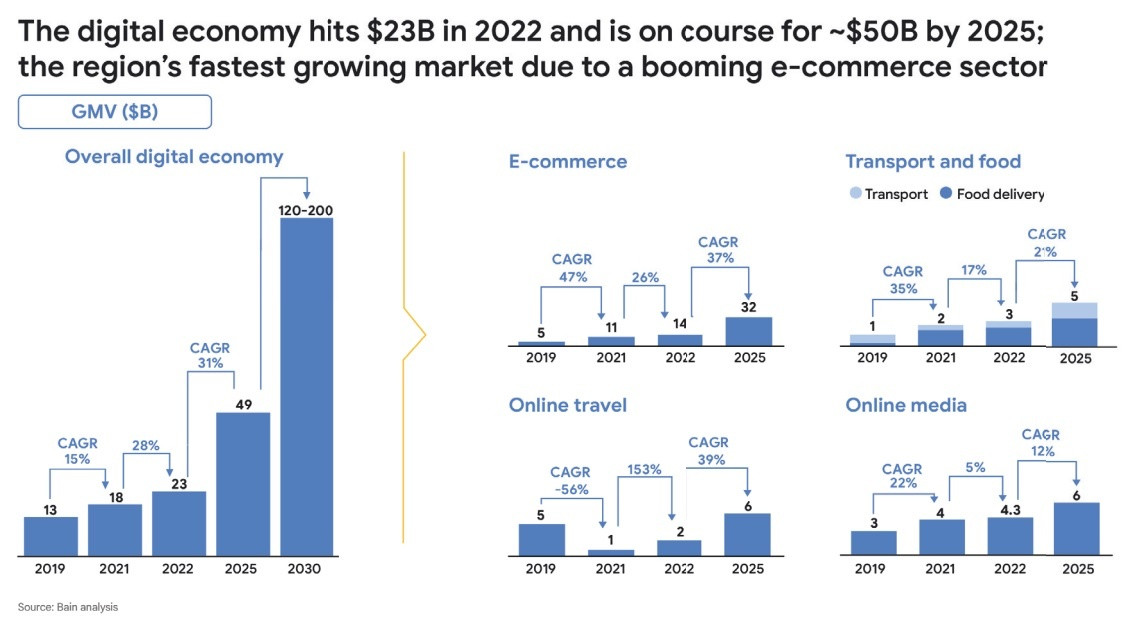Nguyen Hoa Cuong, deputy director of the Central Institute of Economic Management, said the digital economy has a lot of potential for development in Vietnam and was the basis for the economy to recover better post-pandemic.
“It is estimated that with the development of the digital economy, the carbon emissions of this industry are significantly larger than that of aviation. We need to recognise that, on the one hand, we must promote the potential of the digital economy, and on the other hand, not ignore sustainable development goals,” said Cuong.

While areas like e-commerce mean users do not need to travel to the store and retailers do not have to print invoices, for example, the industry still emits a lot of carbon into the environment through the installation of data centres, the use of the Internet of Things, and last-mile delivery services.
According to the “e-Conomy SEA 2022” report by Google, Temasek, and Bain & Company, the scale of Vietnam’s digital economy could reach $50 billion by 2050; with e-commerce making the most vital contribution. This report said, if optimised, emissions from e-commerce activities will be significantly reduced from 30-40 per cent compared to normal commercial activities, contributing to the sustainable development of the wider economy.
Lai Viet Anh, deputy director general of the Vietnam E-commerce and Digital Economy Agency (iDEA) under the Ministry of Industry and Trade, emphasised sustainable development of the digital economy as a big challenge “To achieve this, we need to change behaviour that comes from trading floors and customers,” said Viet Anh.
Meanwhile, tax management by organisations and individuals doing business in e-commerce faces difficulties because sellers often maintain many booths on one e-commerce platform, or across many platforms at the same time. Along with that, controlling cash flow on digital platforms is not easy with non-cash payment methods being so diverse.
In addition, buyers and sellers in Vietnam still prefer to pay cash on delivery, rather than using non-cash payment methods.
According to iDEA, last year retail e-commerce revenues in Vietnam reached around $16.4 billion, up 20 per cent compared to 2021 and accounting for 7.5 per cent of retail sales of consumer goods and services nationwide. But in the same year, the tax agency only collected $25.3 million from organisations and individuals earning income from e-commerce businesses and providing digital services in Vietnam.
Along with that, since March 2022 when cross-border businesses in Vietnam started to declare and pay taxes, authorities have only collected around $145 million from 42 companies. Of these, the six major foreign corporations of Meta, Google, Microsoft, TikTok, Netflix, and Apple account for 90 per cent of the market share in revenue of e-commerce services and cross-border digital platforms in the country.
According to Ta Thi Phuong Lan, deputy director of the Tax Administration Department for Small and Medium Enterprises, Business Households, and Individuals, transactions and values are still not commensurate with reality. The General Department of Taxation will continue to analyse and assess risks to direct tax authorities at all levels.
“We will keep spreading the message that taxpayers who are on e-commerce platforms must report and pay taxes through approved exchanges,” said Lan.
“The tax authority will also use information on business activities through platforms, carry out reviews, request appropriate declarations, adjust revenues, and handle arrears based on the information provided to the nation’s e-commerce portal.”
Tran Minh Tuan, Director of Digital Economy and Society, Ministry of Information and Communications
Vietnam’s digital economy remains modest, leaving significant room for future development, especially in connectivity, digital payment, and digital entertainment.
Urban digital users in Vietnam have the highest level of digital service adoption, of which e-commerce, transportation services, and food delivery top the list. Digital financial services have grown tremendously. The digital lending sector achieved the fastest compound annual growth rate at 114 per cent between 2021 and 2022.
Nguyen Thanh Hung, Member Vietnam E-commerce Association
Vietnam is currently facing many barriers in the process of developing the digital economy. The infrastructure is not synchronised, digital connectivity is still low, and the institutional system has not really facilitated the digital economy.
Development of the digital economy and high-quality human resources for the development of the digital economy are lacking and weak, and there is a lack of regulations on consumer protection. In addition, the innovation capacity of the private sector is considered as one of the major limitations for the development of Vietnam’s digital economy.
Source: VIR